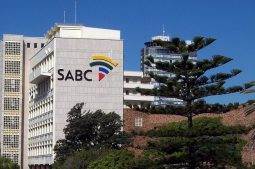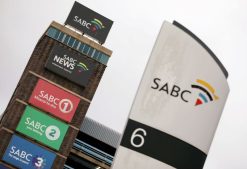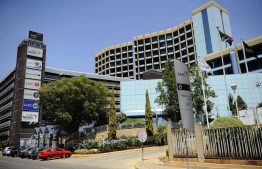The Communication Workers Union (CWU) has vowed to continue protesting after talks with the South African Broadcasting Corporation (SABC) deadlocked again. The union described Monday’s meeting with the SABC management as a futile exercise.
The union says it’s disappointed that SABC management called a meeting and then showed up with no agenda.
They say the board has yet to respond to their memorandum issued on Friday. The union wants the retrenchment of 400 permanent staff to be stopped immediately. They are also calling for the board to be dissolved and for the SABC to be placed under administration.
Staffers continue with lunchtime pickets:
The SABC on Friday suspended the Section 189 process for seven days to allow for further engagements with stakeholders.
The CWU’s Sibusiso Khanyile says, “So when we got there, we were told we were there to talk about alternatives and not the structure. How do you talk about the alternatives of Section 189 without the issues of the structure, and understanding how the overall SABC works. So, basically, from CWU nothing happened in that meeting. Then we were clear that we’re open to engagements, and want them to retract. (They) need to call us when they already have a mandate of the board. 1, answering to our memorandum and reversing section 189. So. that’s where we are, as CWU. We’re saying we continue with the struggle. We continue with the strike,” says CWU’s Sibusiso Khanyile.
SABC to meet unions:
SABC GCEO attempts to address protesting workers
On Friday, SABC Chief Executive Madoda Mxakwe tried to address striking CWU members outside the headquarters of the public broadcaster after receiving a memorandum against retrenchments. However, he was unable to speak above the noise of the crowd.
He said SABC management would respond to the demands this week.
CWU members are holding pickets outside SABC offices across the country. The union had given SABC management and the board until 17:00 on Thursday to stop the retrenchments and to retract all letters of redundancy that have already been issued to affected staff.
An urgent SABC board meeting took place late on Thursday and in the early hours of Friday, resulting in the board issuing a statement announcing that they had suspended the Section 189 retrenchment process for seven days to allow for further consultation.
Mxakwe said the SABC board will study the memorandum and then management will consult with the union.
“We have received this memorandum and we will then take it to the board of the SABC and once a response has been submitted, we will then accordingly engage with the leadership of CWU in terms of the outcome and the ANC Youth League.”
Political support
The African National Congress (ANC) Spokesperson Pule Mabe as well as a representative of the party’s Youth League also addressed the striking workers outside the SABC in Auckland Park, on Friday.
The league said it could not stand by and watch as SABC management and the board compromised indigenous languages in the name of restructuring.
The league’s Tlangi Mogale said there have to be other ways of turning the SABC around.
Public broadcaster’s mandate
The KwaZulu-Natal provincial government has added its voice on the looming retrenchments at the SABC and the South African Qualifications Authority.
KZN Premier Sihle Zikalala says job cuts at the SABC will not only add to the numbers of unemployed, but it will compromise the public broadcaster’s mandate of reaching the poorest of the poor some of who are in deep rural areas.
“The media reported widely on imminent retrenchment in the country in particular in some of the state-owned entities. This includes the SABC as well as the South African Qualifications Authority. We have heard the cry and pain of workers especially those who are employed by the SABC and in various entities. For a long time, the media industry has been shedding jobs and this is now frustrating coming to workers even at the level of the SABC.”






